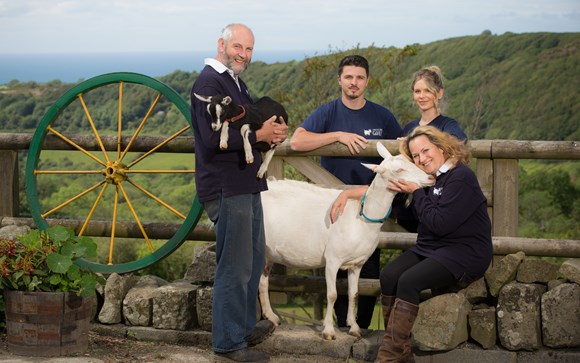The Chuckling Goat launched in 2014 when Texan former radio talk show host Shann Nix-Jones joined Welsh farmer Richard Jones, whose cultural roots are immersed deep in his 25-acre farm, near Brynhoffnant, Llandysul, to produce kefir from goat milk.
The company is now a thriving enterprise with customers across the globe. But despite the obvious temptations to move to an industrial unit closer to the transport infrastructure, the couple has resisted in order to develop their processing capacity on the original farm.
Sustainability and development in harmony with the land and the environment lie at the heart of the company’s operation. The Joneses are proud of the fact that the building where the kefir is produced, which contains packing areas, fermentation units, a labelling facility and a staff canteen, is sunk into the ground and surrounded by more than 2,000 trees so that it almost disappears into the landscape.
It is all part of a guiding principle built on family values and development in harmony with the natural order. Richard says: “Shann always says it’s like the circle of life. The goats produce the muck, the muck goes on the fields, the fields then are harvested for hay - we still make traditional small bales - and the goats eat the hay. It’s a full circle.”
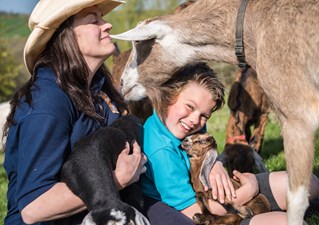
Shann, full of energy said: “I kept thinking, we’ve got goats. How can we use the goats’ milk? Where is the opportunity there? That's the way my mind always works. That's what I bring to the equation; how is this an opportunity?”
Shann’s ‘Eureka moment’ came when she heard a Russian doctor talking about goat’s milk kefir and its therapeutic qualities on the radio. Her mind racing, she contacted the doctor to learn how to make the highest standard of therapeutic kefir.
As she listened, she realised that they had found their opportunity. The doctor advised her to use goats’ milk instead of cows’ milk, use real, living kefir grains and never add sugar or flavourings because these things will degrade the probiotics. It’s a set of principles that the company lives by still.
Kefir is a cultured, fermented milk drink, similar to yoghurt – but thinner in consistency. It is also a good source of calcium and is rich in probiotic bacteria essential for gut health.
Richard said: “We thought we should be able to make that, so we made some in the kitchen. The taste needed some work, but it was very, very healthy. It just went from there. From literally making things in the kitchen sink to what you see today.
“It started like that. Within five years we had a massive increase in turnover. I employ 24 staff here now. We’ve only got about 30 goats because I haven’t got the land so unfortunately we have to buy in the bulk of our milk which isn’t ideal, but it’s the way it’s got to be.”
Central to the operation are the goats. Richard explains: “The goats will graze on rough fields. They’ll always run to the hedges and nibble away at them.
“We buy in natural feedstuffs for them. I refuse to buy anything with soya in because I’m a bit dubious about what it does. People have kept goats for centuries. Ours are just bred to produce more milk than they would have done centuries ago.”
Richard added: “Farming-wise I think we are very sustainable because we’re doing it in as old-fashioned a way that we can. We've got thick hedges and we’ve planted more hedges.
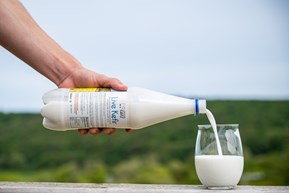
The company puts an emphasis on employing family and local people, many of whom join straight from school and who become part of an extended family, all intended to enhance the local economy.
Richard says: “They’re buying their fuel locally. They’re buying quite a bit of their food locally. It’s a slightly different angle on sustainability, but we are helping to provide employment for the local Londis mini market when two or three of us go up every day to buy lunch.
“Having our business here contributes to the rural economy and we are involved in the community. My five year old grandson goes to the local primary school as well and we’re hoping it will continue in that way.”
As the company - and the profits - grew, so did the logistical scale of the process and the couple had to move its operation out of the kitchen into a specially adapted barn and later into a custom-designed building. On busy weeks they now process up to 10,000 litres of goat’s milk shipped in each week by tanker.
The family also developed a range of award-winning kefir based skincare products especially effective in treating conditions such as psoriasis and eczema.
It was a new way of working for Shann, who has learned a new way of being connected to her family, business and community since coming to Wales.
“Coming from America, we slash and burn. That’s the way it is. We get it from the pioneers. You move into an area, you slash and burn it and you farm it for a little bit and and as soon as you see neighbours on the horizon it’s time to move on,” she said. “That’s the old model. The way we operate our business now is the opposite of that.”
For Richard, with his roots deep in the land and the farming community, the concept of sustainability was simply a responsible, traditional way to do business. He said: “Sustainability doesn’t mean the same thing to all people. To me, sustainability means looking after the land to make sure it can keep on giving. We’ve got to give to it,before it can give back to us.”
Shann agreed: “I think sustainability is also about relationships. You have a relationship with the land - you don’t just dump all over it. You pay attention to it. What does the land need? What does the land want? What do you have to do to take care of the land? You don’t just drain all the goodness out of it, dump all your rubbish there and leave.
“That’s an emotional one for me because being American I never had a sense of place and rootedness. Rich has deep connections to his sense of place and rootedness. It’s the Welsh concept of ‘Perthyn’ so I learned that lesson with great joy.”
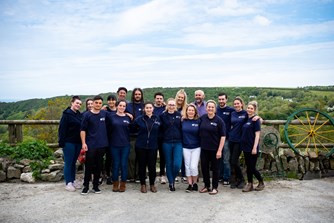
Doing things as a family is at the core of everything they do. It’s not only the physical harvesting of a crop but the bonding experience it brings in its wake. Richard cites a recent potato harvest to emphasise the point.
He says: “We grow our own potatoes. It’s only about an acre of potatoes that we grow and we had four generations picking. My mother in law is eighty-two and I’ve got two two-year-old and one five year old as grandchildren.
“We were all there picking potatoes. It might not have been cost effective in terms of cash; you can buy potatoes very cheaply. But it benefited the ground having it turned over; having a different crop on it; and it definitely benefited our family both mentally and physically.”
Shann adds: “My eighty-two year old mother was sitting there in the camp chair watching, and all the little grandchildren were playing, eating mud, potatoes, and worms and getting dirty. It was brilliant. That’s what we’ve got to keep doing. We hope after our day they will keep these traditions alive.”
As Richard reflects on how he farms, he speaks about the role farmers play as guardians of the land and the environment. He is currently working to cultivate some newly acquired fields. Combining family preferences, commercial and environmental needs is something that comes naturally.
“The field is three and a half acres and had been left to go wild by the previous owners. The goats have now eaten the brambles back, and I’ve cut a few gorse bushes back to make it accessible. We are making it usable for my children and my children’s children. There's a pond, and my grandkids love playing there.
“If we’d let it go wild like the previous owner had and listened to his argument you’d end up with a jungle. It’s no good for my grandchildren to have a field of ten foot high brambles that you can’t walk through.”
It is the blend of traditional and cutting edge that allows the Chuckling Goat to thrive and move forward in tune with environmental necessities at its heart.
Now the couple want to expand their findings about gut health. The latest scientific research indicates that gut health can affect a whole range of seemingly unconnected health conditions from psoriasis to anxiety.
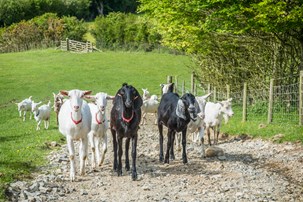
The company is currently preparing to launch their own Microbiome Test, in cooperation with Cambridge University, which is planned for 2022.
Shann says: “We have recently hired distinguished microbiologist Dr. Miguel Toribio-Mateas as our Head of Research and Development, and together we are working on various scientific publications. Don’t be fooled by the nice views. We’ve got some cutting edge research going on here.”
Next up for the couple is yet another innovative enterprise called Ana’s Farmacy, designed to produce medically therapeutic food that is local, sustainable, and gut healthy.
“I would like to buy wonky veg from local organic growers who otherwise would be discarded. So we’ll be dealing with the problem of food waste as well. We’re going to make chutneys, pickles and herbal vinegars that have therapeutic benefits,” says Shann.
The couple are using their experience and knowledge gained in developing Chuckling Goat to perpetuate their ideals.
Shann concludes: “It has to be good from the ground up. Good for the microbes in the soil, good plants, good for the animals, people, community, customers and planet. If it's not good all the way down then it’s not sustainable. And if it’s not sustainable - we’re not interested. We’re here to prove that you can do well, by doing good.”



